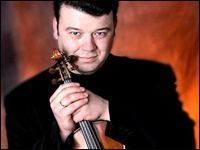In recent weeks the Philadelphia Orchestra has performed several programs around music of Tchaikovsky, while just block away the Academy of Vocal Arts was performing a small scale, but vocally big production of Pique Dame (the Queen of Spades). Add all the snow that was falling in Philly, and it had the feel of a Tchaikovsky festival. A warm reminder that Russian culture survives ugly regimes and Peter Ilyich Tchaikovsky- Russian musical genius who happened to be gay, is so much more significant than the morbid views of bigoted politicians.
Late in January, in his first appearance with the Philadelphia Orchestra, conductor Tugan Sokhiev (on the podium regularly at the Mariinsky Theatre) brought luster to all three Russian composers on his program. His ease and warmth with the orchestra was palpable right away as he launched into Nikolai Rimsky-Korsakov's Battle of Kerzhenets from The Legend of the Invisible City of Kitezh which is a tone poem packaged in military march. In fact, this is the symphonic third act to a mythical battle and incorporates driving orchestral narrative. The woodwinds especially vibrant, with the ethereal and steely oboe of Peter King, among the many standouts.

Israeli violin soloist Vadim Gluzman followed, taking a moment to check his strings and then with a cool nod launched into Tchaikovsky's Violin concerto, dubbed "unplayable" by some violinist at the time of its debut. A composition that is dramatic, witty, playful, musically innovative and as earthy in parts as a gypsy fiddler serenading along the Ural Mountains.
Tchaikovsky's music is not only favored by Philly audiences, it is often a showcase for the Philadelphia strings and under Sokhiev, playing with reined in sonic power. Gluzman was immediately zoned in and his opening bars were steeled and silky. Guzman a bit cocky in the cadenza but with intent that dives deeper into Tchaikovsky's edgier accents. The audience coaxed Gluzman back for four bows and he responded in kind with a solo encore of a Bach piece.
Maestro Sokhiev turned Modest Musorgsky's Pictures from an Exhibition (Orch. Ravel) into more than a showpiece to close the concert. Detailing the deeper Russian musicality and under-streams running through that can easily be diluted by orchestras, in their gallop to Musorgsky's majestic crescendo. The orchestra's brass was particularly powerful in their clarity, among the standout solos, the supple tuba herald by Carol Jantsch and the lustrous strings of harpist Elizabeth Hainen